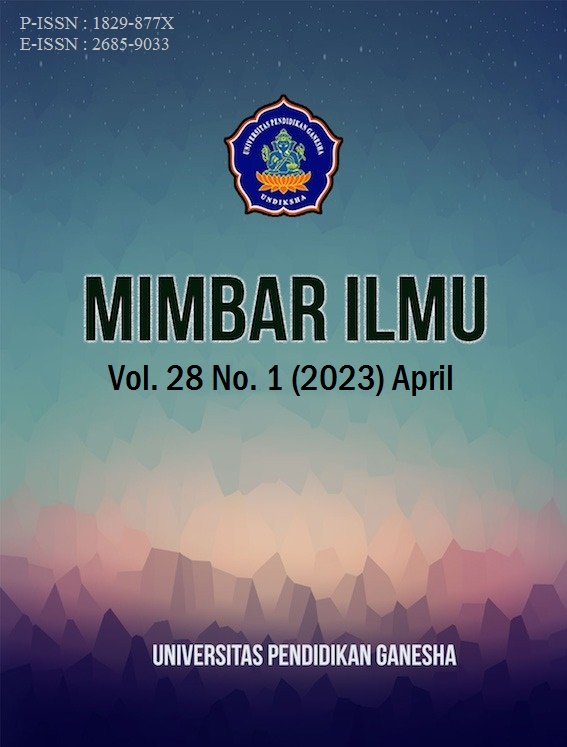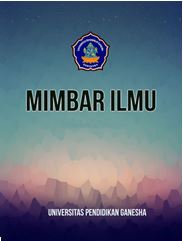Gender Responsive Pedagogy in Thematic Learning in Elementary Schools
DOI:
https://doi.org/10.23887/mi.v28i1.55044Kata Kunci:
Thematic Learning, Gender Responsive, Elementary SchoolAbstrak
Gender-responsive thematic learning still needs to be found in elementary schools. Gender bias is still found in some student teaching materials. It can trigger the emergence of a mindset in students that will continue to be carried into adulthood, resulting in gender inequality. This study aims to analyze gender-responsive thematic learning in elementary schools. This research is a case study, with the subjects involved, namely 2 class V teachers. Data collection techniques used in this study were interviews, observation, and documentation, with research instruments in the form of observation and interview guidelines. Data analysis techniques are carried out through several stages, namely data collection, data reduction, data display, and making conclusions. The results of this study indicate that teachers have a very important role in implementing gender-responsive thematic learning in elementary schools. Gender-responsive thematic learning in elementary schools is carried out by determining learning objectives, making learning tools like lesson plans and teaching materials free from gender bias, and conducting fair and objective assessments. Classroom management is carried out by providing the same facilities to students in the learning process, not to benefit or harm one gender.
Referensi
Abdiyah, L., & Subiyantoro, S. (2021). Penerapan Teori Konstruktivistik Dalam Pembelajaran Tematik Di Sekolah Dasar. ELSE (Elementary School Education Journal) : Jurnal Pendidikan Dan Pembelajaran Sekolah Dasar, 5(2), 127. https://doi.org/10.30651/else.v5i2.6951. DOI: https://doi.org/10.30651/else.v5i2.6951
Abidin, Z. (2017). Kesetaraan Gender dan Emansipasi Perempuan dalam Pendidikan Islam. Tarbawiyah Jurnal Ilmiah Pendidikan, 12(01), 1–17. https://ejournal.metrouniv.ac.id/index.php/ tarbawiyah/article/view/420.
Abraha, M., Dagnew, A., & Seifu, A. (2019). Gender Responsive Pedagogy: Practices, Challenges & Opportunities - A Case of Secondary Schools of North Wollo Zone, Ethiopia. Journal of Education, Society and Behavioural Science, 30(3), 1–17. https://doi.org/10.9734/jesbs/2019/v30i330128. DOI: https://doi.org/10.9734/jesbs/2019/v30i330128
Almelhem, S., Almshhor, E., Alabdullah, S., Kadan, B., Alzoabi, M., & Jhar, A. (2022). Factors affecting gender balance in higher education in northwest Syria: Challenges and potential actions. International Journal of Educational Research Open, 3(1), 100164. https://doi.org/10.1016/j.ijedro.2022.100164. DOI: https://doi.org/10.1016/j.ijedro.2022.100164
Anjani, A., Syapitri, G. H., & Lutfia, R. I. (2020). Analisis Metode Pembelajaran di Sekolah Dasar. Fondatia, 4(1), 67–85. https://doi.org/10.36088/fondatia.v4i1.442. DOI: https://doi.org/10.36088/fondatia.v4i1.442
Apriyanti, N. (2020). Anaisis Evaluasi Pembelajaran Daring Berotientasi. Jurnal Pendidikan Dasa, 1(1). http://journal.unj.ac.id/unj/index.php/psdpd/article/view/17760/9414.
Azzahra, M., & Amaliyah, N. (2022). Analisis Faktor Penyebab Kesulitan Siswa Dalam Pembelajaran Tematik Di Kelas IV Sekolah Dasar. Jurnal Cakrawala Pendas, 8(3), 851–859. https://doi.org/10.31949/jcp.v8i3.2677. DOI: https://doi.org/10.31949/jcp.v8i3.2677
Barreiro-Gen, M., Lozano, R., Temel, M., & Carpenter, A. (2021). Gender equality for sustainability in ports: Developing a framework. Marine Policy, 131(1), 104593. https://doi.org/10.1016/j.marpol.2021.104593. DOI: https://doi.org/10.1016/j.marpol.2021.104593
Basri, I. (2017). Evaluasi Pembelajaran Sekolah Dasar (SD) Berbasis Pendidikan Karakter dan Multikultural. Jurnal Ilmiah Sekolah Dasar, 1(4), 247. https://doi.org/10.23887/jisd.v1i4.12593. DOI: https://doi.org/10.23887/jisd.v1i4.12593
Bhat, S., Bhat, S., Raju, R., D’Souza, R., & K.G., B. (2020). Collaborative Learning for Outcome Based Engineering Education: A Lean Thinking Approach. Procedia Computer Science, 172(1), 927–936. https://doi.org/10.1016/j.procs.2020.05.134. DOI: https://doi.org/10.1016/j.procs.2020.05.134
Buaton, R. A., Sitepu, A., & Tanjung, D. S. (2021). Pengaruh Model Pembelajaran Kooperatif Tipe Group Investigation terhadap Hasil Belajar Siswa pada Pembelajaran Tematik di Sekolah Dasar. Edukatif : Jurnal Ilmu Pendidikan, 3(6), 4066–4074. https://doi.org/10.31004/edukatif.v3i6.1398. DOI: https://doi.org/10.31004/edukatif.v3i6.1398
Cahyadi, R. A. H. (2019). Pengembangan Bahan Ajar Berbasis Addie Model. Halaqa: Islamic Education Journal, 3(1), 35–42. https://doi.org/10.21070/halaqa.v3i1.2124. DOI: https://doi.org/10.21070/halaqa.v3i1.2124
Chaerunnisa, L. Y. (2022). Studi Kasus Pembelajaran Tematik Integratif Berbasis Gender di Madrasah Ibtidaiyah. Journal of Integrated Elementary Education, 2(1), 18–28. https://doi.org/10.21580/jieed.v2i1.10854. DOI: https://doi.org/10.21580/jieed.v2i1.10854
Cheng, F.-C., Wang, Y.-L., Wang, L.-H., Yu-Fong Chang, J., Liu, S.-Y., & Chiang, C.-P. (2023). Overview of the dental education system and gender distribution of undergraduate dental students in Taiwan. Journal of Dental Sciences, 18(1), 420–427. https://doi.org/10.1016/j.jds.2022.11.011. DOI: https://doi.org/10.1016/j.jds.2022.11.011
Fauzi, S. A., & Mustika, D. (2022). Peran Guru Sebagai Fasilitator Dalam Pembelajaran Di Kelas V Sekolah Dasar. Jurnal Pendidikan Dan Konseling, 4(3). https://doi.org/10.31004/jpdk.v4i3.5113.
Firdaus, M., & Wilujeng, I. (2018). Pengembangan LKPD inkuiri terbimbing untuk meningkatkan keterampilan berpikir kritis dan hasil belajar peserta didik. Jurnal Inovasi Pendidikan IPA, 4(1), 26–40. https://doi.org/ 10.21831/jipi.v4i1.5574. DOI: https://doi.org/10.21831/jipi.v4i1.5574
Firdausiyah, A. dkk. (2018). Urgensi Prinsip dan Faktor Kurikulum dalam Mencapai Keberhasilan Pendidikan (Studi Analisis Implementasi Kurikulum 2013). Jurnal Pendidikan & Keislaman, 3(1), 77–87. https://doi.org/10.230303/staiattaqwa.v7i2.124.
Hafizha, A. & A. (2022). Analisis Pemahaman Guru Terhadap Gaya Belajar Siswa. Kajian Pendidikan Dan Hasil Penelitian, 8(1), 25–33. https://journal.unesa.ac.id/index.php/PD/article/view/15041. DOI: https://doi.org/10.26740/jrpd.v8n1.p25-33
Haris, I. abdul. (2021). Pembelajaran Responsif Gender Dalam Pendidikan Islam. Jurnal An-Nur: Kajian Pendidikan Dan Ilmu Keislaman., 7(1), 19–31. https://journal.an-nur.ac.id/index.php/annur/article/view/39.
Haryani, T. N., & Nurhaeni, I. D. A. (2019). Evaluasi Integrasi Nilai Gender Pada Pendidikan Menengah (Studi Pada Sekolah Menengah Atas Di Kabupaten Sragen). Spirit Publik: Jurnal Administrasi Publik, 14(1), 94. https://doi.org/10.20961/sp.v14i1.34585. DOI: https://doi.org/10.20961/sp.v14i1.34585
Hasanah, U. (2019). Peran Pendidik dalam Pembelajaran Berbasis Gender pada Anak Usia Dini di Kober Tunas Bangsa. Tarbawy : Jurnal Pendidikan Islam, 6(1), 43–49. https://doi.org/10.32923/tarbawy.v6i1.872. DOI: https://doi.org/10.32923/tarbawy.v6i1.872
Hidir, A., & Meilani, N. L. (2017). Pendidikan Responsif Gender di Kabupaten Rokan Hilir Achmad Hidir, Nur Laila Meilani, Harapan Tua RFS. Jurnal Primary Program Studi Pendidikan Guru Sekolah Dasar Fakultas Keguruan Dan Ilmu Pendidikan Universitas Riau, 5(2), 214–231. https://doi.org/ 10.33578/jpfkip.v5i2.3710. DOI: https://doi.org/10.33578/jpfkip.v5i2.3710
Iskandar, W., & Estate, M. (2022). Kepemimpinan Perempuan Sebagai Kepala Sekolah. Jurnal Inovasi Penelitian, 3(1), 4591–4598. https://doi.org/10.47492/jip.v3i1.1674.
Isnanto, I., Pomalingo, S., & Harun, M. N. (2020). Strategi Pengelolaan Kelas Di Sekolah Dasar. Jurnal Pendidikan Glasser, 4(1), 7. https://doi.org/10.32529/glasser.v4i1.392. DOI: https://doi.org/10.32529/glasser.v4i1.392
Juliana, G., Sendratari, L. P., & Maryati, T. (2019). Bias Gender Dalam Pendidikan (Studi Kasus Pembelajaran Sosiologi Kelas XI dan Potensinya Sebagai Sumber Belajar Sosiologi di MAN 1 Buleleng). E-Journal Pendidikan Sosiologi Universitas Pendidikan Ganesha, 1(1), 23–32. https://doi.org/10.23887/jpsu.v1i1.26663.
Kahamba, J. S., Massawe, F. A., & Kira, E. S. (2017). IMP Awareness and Practice of Gender Responsive Pedagogy in Higher Learning Institutions: The Case of Sokoine University of Agriculture, Tanzania. Journal of Education, Humanities & Sciences, 6(2), 1–16. https://jehs.bongotech.info/index.php/jehs/article/view/100.
Kasus, S., & Pelangiku, I. (2022). Penggunaan Media Pembelajaran Sesuai Klasifikasi Siswa Berkebutuhan Khusus. Jurnal Ilmiah Pendidikan Dasar, 4(1), 137–150. https://doi.org/10.37216/badaa.v4i1.587.
Khoerunnisa, P., & Aqwal, S. M. (2020). Analisis Model-model Pembelajaran. Fondatia, 4(1), 1–27. https://doi.org/10.36088/fondatia.v4i1.441. DOI: https://doi.org/10.36088/fondatia.v4i1.441
Khuzaimah & Farid. (2022). Penerapan Demokrasi Pendidikan pada Pembelajaran Siswa di Sekolah Dasar. Jurnal Pendidikan Sosial Dan Budaya, 4(1), 43. https://doi.org/10.35905/almaarief.v4i1.2176.
Liestyasari, S. I. (2017). Sensitivitas Gender Guru Sekolah Dasar Di Kota Surakarta. In The Journal of Society & Media, 1(2). https://doi.org/10.26740/jsm.v1n2.p53-66. DOI: https://doi.org/10.26740/jsm.v1n2.p53-66
Meri & Mustika. (2022). Peran Guru Dalam Pembelajaran Di Kelas V Sekolah Dasar. Jurnal Pendidikan Dan Konseling, 105(4), 200–208. https://doi.org/10.31004/jpdk.v4i4.5197.
Muafiah, E., Puspita, A. R., & Wanda Damayanti, V. V. (2021). Gender Equality and Social Inclusion (GESI) Pada Dua Sekolah Inklusi Di Ponorogo. Musãwa Jurnal Studi Gender Dan Islam, 19(2), 141–156. https://doi.org/10.14421/musawa.2020.192.141-156. DOI: https://doi.org/10.14421/musawa.2020.192.141-156
Mufidah, N. (2018). Metode Pembelajaran Al-Ashwat. Al Mahāra: Jurnal Pendidikan Bahasa Arab, 4(2), 199–218. https://doi.org/10.14421/almahara.2018.042-03. DOI: https://doi.org/10.14421/almahara.2018.042-03
Mufidah, N., & Kurniawan, A. F. (2022). Implementasi Metode Pembelajaran Kooperatif Tipe STAD dalam Meningkatkan Sikap Toleransi dan Hasil Belajar Siswa. ENTITA: Jurnal Pendidikan Ilmu Pengetahuan Sosial Dan Ilmu-Ilmu Sosial, 4(1), 51–64. https://doi.org/10.19105/ejpis.v4i1.6151. DOI: https://doi.org/10.19105/ejpis.v4i1.6151
Muzaki, H. (2021). Persepsi Mahasiswa terhadap Pembelajaran Daring Selama Pandemi Covid-19 Berdasarkan Perspektif Gender. Jurnal Pendidikan: Teori, Penelitian, Dan Pengembangan, 6(3), 416. https://doi.org/10.17977/jptpp.v6i3.14624. DOI: https://doi.org/10.17977/jptpp.v6i3.14624
Nurhasanah, A., Marini, A., & Sumantri, M. S. (2021). Pengelolaan Pendidikan Berbasis Kebijakan Gender Di Salah Satu Sekolah Dasar Banten. Elementary School Journal PGSD FIP UNIMED, 11(1), 79. https://doi.org/10.24114/esjpgsd.v11i1.24729. DOI: https://doi.org/10.24114/esjpgsd.v11i1.24729
Pollock, E. R., Young, M. D., Lubans, D. R., Coffey, J. E., Hansen, V., & Morgan, P. J. (2021). Understanding the impact of a teacher education course on attitudes towards gender equity in physical activity and sport: An exploratory mixed methods evaluation. Teaching and Teacher Education, 105(1), 103421. https://doi.org/10.1016/j.tate.2021.103421. DOI: https://doi.org/10.1016/j.tate.2021.103421
Prastyo, D. (2022). Prespektif Gender Dalam Penentuan Pengurus Kelas Di Sekolah Dasar. EduStream: Jurnal Pendidikan Dasar, 4(1), 59–63. https://doi.org/10.26740/eds.v4n1.p59-63. DOI: https://doi.org/10.26740/eds.v4n1.p59-63
Putra, D. A. (2018). Kesetaraan Gender dalam Pembelajaran di Sekolah Dasar. Jurnal Pendidikan Dan Pembelajaran Sekolah Dasar, 2(1), 93–103. https://doi.org/10.30651/else.v2i1.1400. DOI: https://doi.org/10.30651/else.v2i1.1400
Ra, C. K., Pehlivan, N., Kim, H., Sussman, S., Unger, J. B., & Businelle, M. S. (2022). Smoking prevalence among Asian Americans: Associations with education, acculturation, and gender. Preventive Medicine Reports, 30(4), 102035. https://doi.org/10.1016/j.pmedr.2022.102035. DOI: https://doi.org/10.1016/j.pmedr.2022.102035
Rahayu, R., & Susanto, R. (2018). Pengaruh Kepemimpinan Guru Dan Keterampilan Manajemen Kelas Terhadap Perilaku Belajar Siswa Kelas IV. Jurnal Penelitian Pendidikan Dasar, 4(2), 220–229. https://doi.org/10.31932/jpdp.v4i2.178. DOI: https://doi.org/10.31932/jpdp.v4i2.178
Rahmiati, R., & Ninawati, M. (2020). Problematika Perkembangan Anak Di Sekolah Dasar: Kekerasan Seksual Pada Siswa Sekolah Dasar dan Pencegahannya. Seminar Nasional Pgsd Uhamka 2020, 135–144. http://repository.uhamka.ac.id/id/eprint/2778/.
Ratnasari, D. (2019). Gender Dalam Perspektif Alqur’an. Humanika, 18(1), 1–15. https://doi.org/10.21831/hum.v18i1.23125. DOI: https://doi.org/10.21831/hum.v18i1.23125
Rismayanti, E. (2022). Peran Guru Sebagai Fasilitator Dalam Menanamkan Karakter Peduli Lingkungan Melalui Program Adiwiyata Di Sdn Petir 1 Kota Tangerang. Inventa, 6(1), 18–28. https://doi.org/10.36456/inventa.6.1.a4798. DOI: https://doi.org/10.36456/inventa.6.1.a4798
Saleemi, S., & Kofol, C. (2022). Women’s participation in household decisions and gender equality in children’s education: Evidence from rural households in Pakistan. World Development Perspectives, 25(1), 100395. https://doi.org/10.1016/j.wdp.2022.100395. DOI: https://doi.org/10.1016/j.wdp.2022.100395
Septianti, N., & Afiani, R. (2020). Pentingnya Memahami Karakteristik Siswa Sekolah Dasar di SDN Cikokol 2. As-Sabiqun, 2(1), 7–17. https://doi.org/10.36088/assabiqun.v2i1.611. DOI: https://doi.org/10.36088/assabiqun.v2i1.611
Suhada, S. (2019). Kesetaraan Gender: Posisi Kepemimpinan Perempuan Dalam Islam. Mumtaz: Jurnal Studi Al-Qur’an Dan Keislaman, 3(2), 169–190. https://doi.org/10.36671/mumtaz.v3i2.39. DOI: https://doi.org/10.36671/mumtaz.v3i2.39
Sujana, I. W. C. (2019). Fungsi Dan Tujuan Pendidikan Indonesia. Adi Widya: Jurnal Pendidikan Dasar, 4(1), 29. https://doi.org/10.25078/aw.v4i1.927. DOI: https://doi.org/10.25078/aw.v4i1.927
Susilawati, T., & Rusdinal. (2022). Pengembangan Media Pembelajaran E-Book Berbasis Blended Learning Tematik Terpadu Di Kelas IV Sekolah Dasar. Jurnal Cakrawala Pendas, 8(2), 378–387. https://doi.org/10.31949/jcp.v8i2.2285. DOI: https://doi.org/10.31949/jcp.v8i2.2285
Tagliacozzo, S., & Di Tullio, I. (2021). Gender equality plans (GEPs) as a framework to devise gender equality measures for disaster research. International Journal of Disaster Risk Reduction, 60(1), 102294. https://doi.org/10.1016/j.ijdrr.2021.102294. DOI: https://doi.org/10.1016/j.ijdrr.2021.102294
Tama, I. G. S., Artanayasa, I. W., & Satyawan, I. M. (2019). Pengaruh Model Pembelajaran Kooperatif Tipe Student Teams Achievement Division Terhadap Hasil Belajar Passing Sepakbola. Jurnal Penjakora, 6(1), 35. https://doi.org/10.23887/penjakora.v6i1.17641. DOI: https://doi.org/10.23887/penjakora.v6i1.17641
Utaminingsih, R., Rahayu, A., & Andini, D. W. (2018). Pengembangan RPP IPA sekolah dasar berbasis problem-based learning untuk siswa learning disabilities. Inovasi Pendidikan IPA, 4(2), 191–202. https://doi.org/10.21831/jipi.v4i2.21401.
Vanner, C., Holloway, A., & Almanssori, S. (2022). Teaching and learning with power and privilege: Student and teacher identity in education about gender-based violence. Teaching and Teacher Education, 116(1), 103755. https://doi.org/10.1016/j.tate.2022.103755. DOI: https://doi.org/10.1016/j.tate.2022.103755
Wati, A. R. Z., & Trihantoyo, S. (2020). Strategi Pengelolaan Kelas Unggulan Dalam Meningkatkan Prestasi Belajar Siswa. Jurnal Dinamika Manajemen Pendidikan, 5(1), 46. https://doi.org/10.26740/jdmp.v5n1.p46-57. DOI: https://doi.org/10.26740/jdmp.v5n1.p46-57
Wiarsih, N., & Astawan, I. G. (2021). Pendidikan Responsif Gender dan Kesehatan Reproduksi dalam Proses Pembelajaran. Mimbar Ilmu, 26(2), 333. https://doi.org/10.23887/mi.v26i2.38505. DOI: https://doi.org/10.23887/mi.v26i2.38505
Wondimu, H. (2022). Gender-based violence and its socio-cultural implications in South West Ethiopia secondary schools. Heliyon, 8(7), 10006. https://doi.org/10.1016/j.heliyon.2022.e10006. DOI: https://doi.org/10.1016/j.heliyon.2022.e10006
Unduhan
Diterbitkan
Cara Mengutip
Terbitan
Bagian
Lisensi
Hak Cipta (c) 2023 Kemil Wachidah

Artikel ini berlisensiCreative Commons Attribution-ShareAlike 4.0 International License.
This work is licensed under a Creative Commons Attribution-ShareAlike 4.0 International License.
Authors who publish with this journal agree to the following terms:
- Authors retain copyright and grant the journal right of first publication with the work simultaneously licensed under a Creative Commons Attribution License that allows others to share the work with an acknowledgment of the work's authorship and initial publication in this journal.
- Authors are able to enter into separate, additional contractual arrangements for the non-exclusive distribution of the journal's published version of the work (e.g., post it to an institutional repository or publish it in a book), with an acknowledgment of its initial publication in this journal.
- Authors are permitted and encouraged to post their work online (e.g., in institutional repositories or on their website) prior to and during the submission process, as it can lead to productive exchanges, as well as earlier and greater citation of published work.








